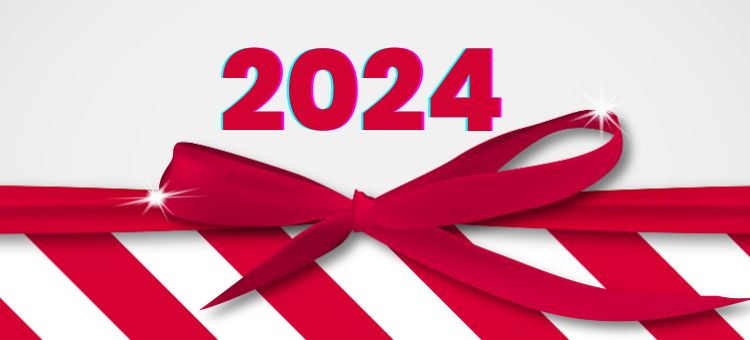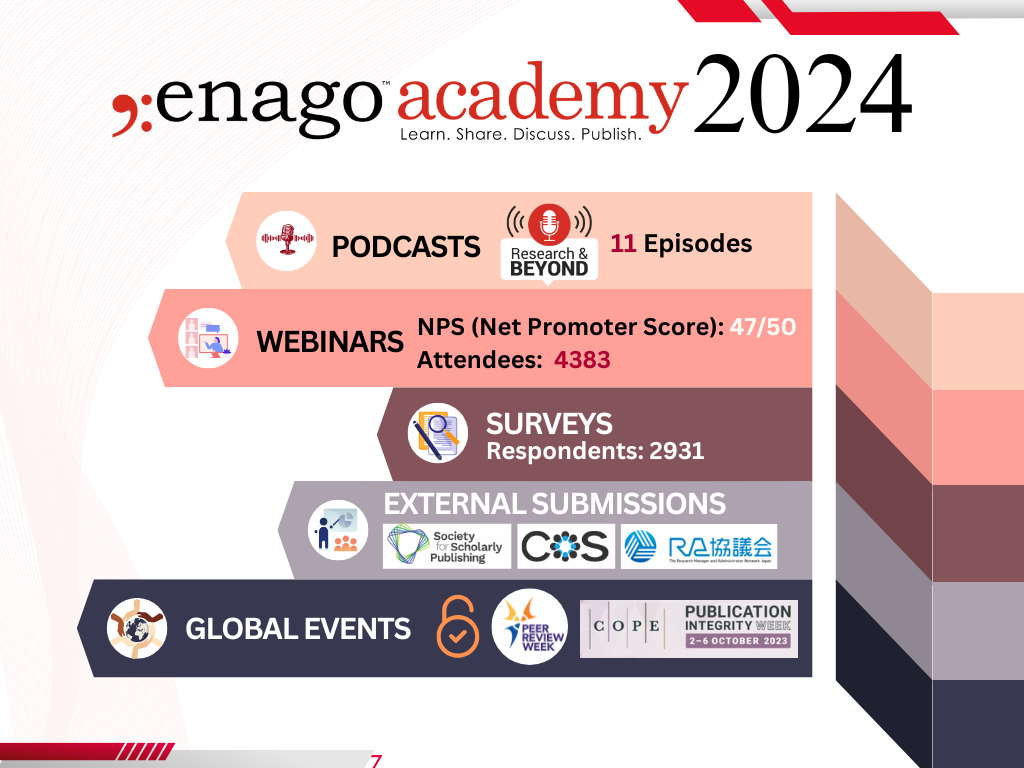2024 Highlights: Shaping scholarly communication with Enago

Enago Academy takes immense pride in reflecting on the milestones that shaped the year 2024 for us. From hosting ground-breaking discussions to participating in global scholarly events, we have actively engaged in conversations shaping the future of the scholarly publishing industry.
Conversations Shaping Research and Academia
Our podcast series, Research and Beyond, spotlighted several influential figures driving transformative change in academia and research ethics. We discussed integrity in research and publishing with Dr. Elisabeth Bik, a trailblazer in detecting image manipulation, who shared her journey from microbiology to becoming an advocate for research integrity. She shared her thoughts about the scale and consequences of image manipulation in research. We also spoke to Dr. Ivan Oransky, co-founder of Retraction Watch, who provided a deep dive into the complexities of reporting misconduct and its impact on scholarly communities. He shared valuable insights on the impact of retractions on the scholarly community and the importance of research integrity.
We discussed the nuances of global equitable access in our podcasts with Dr. Mathew Buys, Executive Director of DataCite, about the importance of fostering global and local collaborations in STM industry and the role of open metadata and digital identifiers in making research outputs more discoverable and accessible. We also spoke to Jennifer Mahar, Executive Peer Review Manager and Client Coordinator at Origin Editorial, about strategies to combat peer review manipulation in the age of digitization and the importance of using AI tools while recognizing and rewarding peer reviewers.
Earlier in the year we also spoke to Damita Snow who shared how embracing DEIA (Diversity, Equity, Inclusion, and Accessibility) strategies can help the scholarly publishing domain amplify diverse voices, dismantle systemic barriers, and ultimately, advance the pursuit of knowledge.
On International Women’s Day, we spoke with Chhavi Chauhan, a Women in AI Ethics leader and a Top 100 Woman of the Future, about ethical AI and diversity in emergent tech. She highlighted how historical data biases create discriminatory products and shared a vision for responsible AI to bridge disparities.
We explored diversity in academia with Dr. Krishna Kumar Venkitachalam, Innovation officer at Enago Academy, who emphasized the importance of equity and advocacy in research. He shares triumphs, challenges, and the ongoing quest for representation and acceptance faced by LGBTQIA+ individuals in STEM fields and academia. He also spoke to us with Dr. Gayatri Phadke about the impact of changing political climates on DEIA initiatives in academia. In their conversation with Enago, they highlighted the challenges in maintaining advocacy efforts when transitioning from academia to corporate settings.
Finally, Dr. Jayshree Seth, 3M’s Chief Science Advocate, illuminated the intersection of science and creativity, encouraging curiosity and bridging gaps between researchers and the public.
Together, these episodes resonated well with our global audience, sparking conversations that extended beyond the boundaries of traditional academic discourse. Building on this momentum, we extended our efforts through interactive webinars that brought experts and researchers together to exchange ideas.
Watch Worthy Webinars
This year we conducted a comprehensive webinar series on the role of Artificial Intelligence (AI) in academic communication. We covered diverse topics like best practices of using AI for manuscript writing, plagiarism and AI-content detection, and peer review. “AI for Accuracy in Research and Academic Writing: Key tips and strategies”, covered effective strategies for utilizing AI tools to explore the most relevant and recent literature with a live demonstration of such tools.
Another webinar which was very well received by our global community was, “How to Deal with Journal Rejection: Converting a failure into an opportunity!” Here we touched upon causes of rejection, understanding reviewers’ comments, and tips on avoiding journal rejection.
Last but not least is our webinar, “Insider Secrets: Boost your manuscript submission success and research impact”. Whe we discussed the importance of publication extenders, tips for compliance checks, free checklists, and resources. We also take the viewers on a walkthrough of the manuscript submission process of a renowned journal.
The polls conducted during these live sessions provided valuable insights into the engagement and shed light on some actionable strategies. Along similar lines, we also conducted global surveys on our website to get a better understanding of how the academic community perceives research ethics.
Assessing Community Opinions and Awareness
We conducted two surveys in 2024 as part of our Research Risk Assessment Series. In the first survey, we investigated the perceived awareness and adherence to existing ethical guidelines using a questionnaire titled, “Ethical Dimensions Shaping Research: A comprehensive survey mapping the adoption and compliance of research integrity”. We gained valuable insights from 2500 responses on common challenges around the ethical use of AI in research and publishing.
The second global survey of 2024 determined the impact of retractions in academic publishing titled “Research Integrity and Retractions: A global study to understand the impact and response around ethical misconduct”. We surmised awareness of ethical guidelines and the role of stakeholders in ethical publishing. The study also assessed the status of the mechanisms for reporting and investigating misconduct.
We will be sharing these study outcomes through comprehensive reports soon! However, you can check out our opinion piece titled “Peer Review and Research Ethics: Insights on challenges, innovations, and future directions”, where we shared a glimpse of our findings during our global Peer Review Week, 2024 celebrations.
Advancing Academic Communication Through Global Engagements
Enago actively participated in 3 global events around critical themes in scholarly publishing in 2024.
1. Peer Review Week
For Peer Review Week 2024, focused on “Innovation and Technology in Peer Review,” our contributions ranged from webinars and infographics to comparative analyses of AI tools. During the week our events were centered around the ethics of integrating AI in peer review workflows. We discussed innovative technologies and their responsible application in a panel discussion.
2. Open Access Week
In October, we celebrated Open Access Week, themed “Community Over Commercialization”. We hosted discussions, thought pieces, and podcasts. We highlighted themes like equitable publishing practices and the transformative role of preprints in promoting accessibility in a collaborative article with George Curie.
3. COPE’s Publication Integrity Week
For COPE’s Publication Integrity Week, we reinforced the importance of research ethics through blogs, panel discussions, and podcasts. For this event, we tackled pressing issues like image manipulation, retractions, and ethical challenges in publishing. We held a panel discussion with Leslie D. McIntosh, VP of Research Integrity, Digital Science and Daniel Ucko, Head of Ethics and Research Integrity, American Physical Society, Physics. Where we about the latest methods for detecting and preventing research misconduct to uphold ethical standards.
Hosting such global events demonstrates our commitment to foster inclusivity and integrity in scientific communication. To further amplify our efforts, we presented actionable insights and frameworks to advance research communication and collaboration at international platforms in 2024.
Driving Change in Research
Enago’s external submissions discussed critical issues in scholarly communication at leading international forums this year.
1. Year of Open Science Conference, 2024
At the Center for Open Science (COS), our lightening talk on open access models emphasized the need for equitable, income-aware article processing charges (APCs). Our talk aimed at fostering global accessibility and breaking down barriers for researchers in developing economies. We emphasized that promoting transparent funding policies and alternative models to educate researchers on open-access publishing avenues. Furthermore, we proposed a potential solution in a collaborative, multinational funding approach redistributing costs equitably based on economic indicators.
2. 2024 Annual Society for Scholarly Publishing (SSP) Meeting
At the 2024 Annual SSP meeting, we presented our global study findings on integrating artificial intelligence in research. Here, we proposed frameworks for responsible AI augmentation. Based on our findings, we advocated for universal guidelines to maintain research integrity. Additionally, we proposed developing ethically robust hybrid intelligence models processes like journal finding and plagiarism detection. We emphasized collaboration with institutions and the industry to develop clear guidelines and address ethical breaches effectively.
3. The Research Manager and Administrator Network Japan (RMAN-J) Conference
At the 10th RMAN-J Annual Conference, we highlighted gaps in international funding for Japanese researchers. We shared actionable insights to improve collaboration and maximize global funding opportunities with our poster entry. Researchers can unlock new funding avenues by leveraging digital tools and comprehensive support throughout the funding process — from identification of opportunities to application submission. This strategy not only helps offset the decline in domestic funding but also has the potential to elevate Japanese research on the global landscape.
Our active participation in such global events and contributions at international forums reflect our commitment to fostering equitable and innovative research ecosystems worldwide. Our initiatives, from amplifying underrepresented voices to promoting equitable publishing practices, demonstrate our dedication to achieving inclusivity in research and publication.
As we look ahead to 2025, we invite you to join this journey. Together, we can drive transformative change, amplify diverse voices, and build a stronger, more connected academic community. Join us in shaping the future of research and scholarly communication — where every voice matters, every challenge is an opportunity, and every collaboration sparks progress!










